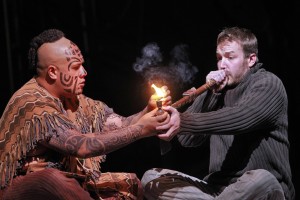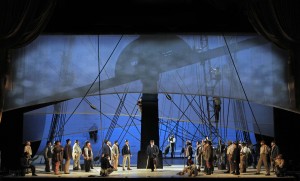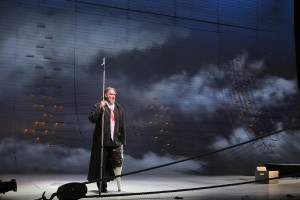It is one of the most memorable first sentences of a novel ever written. With three simple words, it draws us into the story, lets us know who the narrator is, and hints at dramatic transformations to come.
This opening line – Call me Ishmael – was written by Herman Melville in his epic about Captain Ahab’s quest to kill the white whale Moby Dick. One of the surprises of the San Francisco Opera’s current production of Moby Dick is that this line is used in a different way in the story – to very good effect. I won’t spoil the pleasure in telling you how, but would urge you to see this wonderful production yourself.
Born in New York City in 1819, Melville spent four years during his twenties (1841-1845) working on whaling ships. He began as a cabin boy on a whaler heading from Massachusetts, around Cape Horn, to the Pacific. He lived amongst the Typee, took part in a mutiny, and worked for a time as a pin setter in a bowling alley in Honolulu.
Melville was one of the more interesting characters to land in Hawaii during the first half of the nineteenth century, when the whaling industry was at its height. His impressions from that time are notable for their bite: he was no fan of the Christians who came from Massachusetts and other eastern states to spread the word of God to the native Hawaiians.
Unimpressed with the quality of the Westerners who became courtiers to King Kamehameha III, he described them in a footnote to his first novel, Typee, as “a junta of ignorant and designing Methodist elders in the council of a half civilized king ruling with absolute sway over a nation just poised between barbarism and civilization.”
Aside from getting their religion wrong – the missionaries who came to Hawaii were mostly Congregationalists, not Methodists – and insulting Hawaii’s king, Melville did capture the sense of change sweeping over the kingdom. Since the Missionaries first arrived in Hawaii in 1820, they’d given the Hawaiians, whose culture up until then had been oral, an alphabet and printing presses. By the 1840s, a flowering of literacy was taking place in Hawaii.

Jonathan Lemalu (Queequeg) and Stephen Costello (Greenhorn) in SF Opera’s Moby Dick. Photo by Cory Weaver.
Watching the opera of Moby Dick last week, I couldn’t help but think about Melville, who makes a cameo appearance in my history of Hawaii, Lost Kingdom. As someone who loves language, I was awed by the work of Gene Scheer in turning his sprawling, 800 or so page opus, into the 60-page libretto for the opera Moby Dick.
In the novel, Ishmael narrates the story – looking back in time. Instead, Scheer set all the action on the whaling ship. The narrator who begins with the famous line Call Me Ishmael is gone – at least in the role as the person telling the story.
Jane Ganahl, Litquake’s co-founder, profiled Scheer in the opera’s program notes. She also helped organize a Litquake event with the librettist on October 8th that I truly wish I could have attended. He told her that one of the key challenges in adapting a book into another medium is that “people don’t want to see people on stage telling the story, they want to be shown the story. I struggled with how to get at the truth of the story, until I had a breakthrough, and realized I should have the story unfold through the eyes of Greenhorn, the only person who had never been on a whaling ship. His is a transformative journey.” (Greenhorn is the character in the photo smoking a pipe — and baritone Jonathan Lemalu was wonderful as Queequeg.)
Perhaps the most powerful magic for me in the opera was Scheer’s use of Melville’s language. Scheer estimated that at least half the libretto was taken directly from the book. Set to music and sung, the words were more like poetry than prose. Melville’s words set to Jake Heggie’s music was powerful and profoundly moving.

